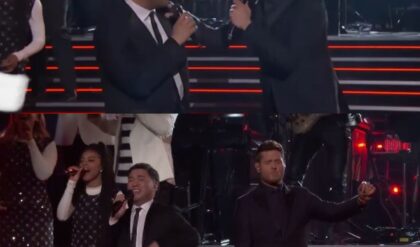
Jodie Foster started acting when she was just six years old and received her first of four Academy Awards nominations for performing when she was only 14, thanks to her work in Martin Scorsese’s “Taxi Driver.” Foster went on to win Best Actress Oscars in 1989 and 1992, cementing her place as one of her generation’s greatest thespians. And yet the long-time actress and filmmaker is still convinced she doesn’t have the natural skill set to be a performer.
“I became an actor because it was my family business,” Foster said during her recent SXSW MasterClass at the 2019 edition of the festival. “I don’t remember becoming an actor, and I think I probably wouldn’t have become an actor. I think I would have become a lawyer, or something boring like that. So I was thrown into a craft that I didn’t necessarily have the right make up for.”
Foster has a well-thought-out theory — which she said she has spelled out in detail via her online MasterClass — that there are two very different aspects of the craft: preparation and execution. “I like to use this metaphor of you are half choreographer and half dancer,” said Foster. ”And you have to be always navigating and juggling and kind of combining the two.” On the set of “Taxi Driver”Columbia/Kobal/REX/Shutterstock
On the set of “Taxi Driver”Columbia/Kobal/REX/Shutterstock
Foster said she is different from other actors, in the sense that the choreography, or intellectual aspect of preparation, comes naturally to her, but the ability to get inside a moment and give herself over to the emotional part of performing is extremely difficult for her.
“Maybe that is what makes my work different, or at least in the ’60s and ’70s from most actors, because I do have an intellectual approach,” said Foster. “I think first, I make decisions, sort of like [if] I do a book report, I do the book report first, and then I have learned to let all that side back in my unconscious and just be in the moment.”
Over the years, Foster has developed a number of “tricks,” or routines, to use all the homework she’s done to trigger her ability get into the moment as a performer. The biggest key is not becoming self-conscious — for example, hair and makeup bringing over a mirror can be a huge problem for the Oscar winner.
“What I’ve learned to do is to totally fuck off before I start and trust that I’m prepared,” said Foster. “I’ve learned to not let self-consciousness in the way by pretending I’m just like you and hanging out with the crew and drinking coffee.”
Yet none of it is enjoyable for Foster, it’s actually quite the opposite, as acting is a huge source of pain and struggle for her. She said that she has propelled herself to being a good actor through a constant sense of failure.
“I think a lot of actors, that life of an actor comes very easily to them,” said Foster. “I see people say, ‘If I was on a desert island, I’d act all the time, I just love it.’ Well, I don’t love it. For me, it’s like emergency surgery. Or it’s like being in the trenches in WWI, it’s something I do because it’s meaningful.” “The Silence of the Lambs”Ken Regan/Orion/Kobal/REX/Shutterstock
“The Silence of the Lambs”Ken Regan/Orion/Kobal/REX/Shutterstock
Ironically, while the craft of acting scares Foster, she has never been scared by some of the terrifying situations her iconic characters have found themselves in films like “Panic Room.” She does admit, however, that she was terrified of Hannibal Lecter in “Silence of the Lambs.”
“The movie didn’t scare me, but Anthony Hopkins (Lecter) scared me,” said Foster. “You’ll notice, if you look at the movie again, … instead of the person looking at the person off-screen, that the actors are actually looking down the lens. And that means I am there, but way behind the camera and I’m just a voice, he can’t see me. And the same is true on my side. So when I’m doing scenes with Dr. Lecter, I just hear this disembodied, scary voice, but I don’t actually see his face. I have to look into the camera and pretend that he’s in the camera.”
Foster explained she never really met Hopkins because she was working on another film prior to “Lambs” and by the time she was on set, Hopkins was already in full Lecter-mode. Meanwhile, the two were kept physically apart not only by the camera setup, but the complicated bar and glass set design that took 20 minutes to get Hopkins in and out of the prison set.
“The last day of shooting, we were having lunch, I was having my tuna fish sandwich and he’s next to me, and I said to him like, ‘I was really scared of you,’ because I never talked to him the whole movie, and he was like, ‘I was really scared of you,’” she recalled.
While early on Foster learned she didn’t have an “actor’s personality,” she did realize she had the perfect mentality to be a director. Her film school was, and continues to be, working with great directors like Martin Scorsese, Spike Lee, Jonathan Demme, and Neil Jordan.
“I’ve worked with great directors and as I’ve gotten older I’ve come to realize that’s the one draw to acting for me now,” said Foster. “For me, it’s really about learning from a director. That was my film school, because I didn’t go to film school.”
Foster loves watching her directing collaborators making hundreds of decisions and becomes enthralled trying to figure out the logic behind each of their choices, and how those choices define them as storytellers. Of all the directors Foster has worked with, there’s one she singles out as having been the most influential on her own filmmaking process. David Fincher, Jodie Foster, and Kristen Stewart on the set of “Panic Room”Merrick Morton/Columbia/Kobal/REX/Shutterstock
David Fincher, Jodie Foster, and Kristen Stewart on the set of “Panic Room”Merrick Morton/Columbia/Kobal/REX/Shutterstock
“I’ve learned more from [David Fincher] than any other director I’ve ever worked with,” said Foster. “He’s an amazing technician – he gets mad when I say that. There isn’t any craft of filmmaking that he can’t do better than the person that he’s hired and his films have such a clear directorial hand. Every single thing is architected on a David Fincher movie, which sometimes means you are doing a 120 takes.”





